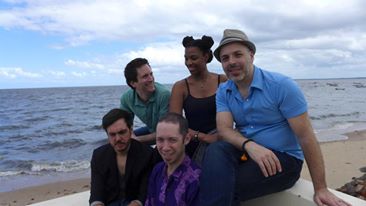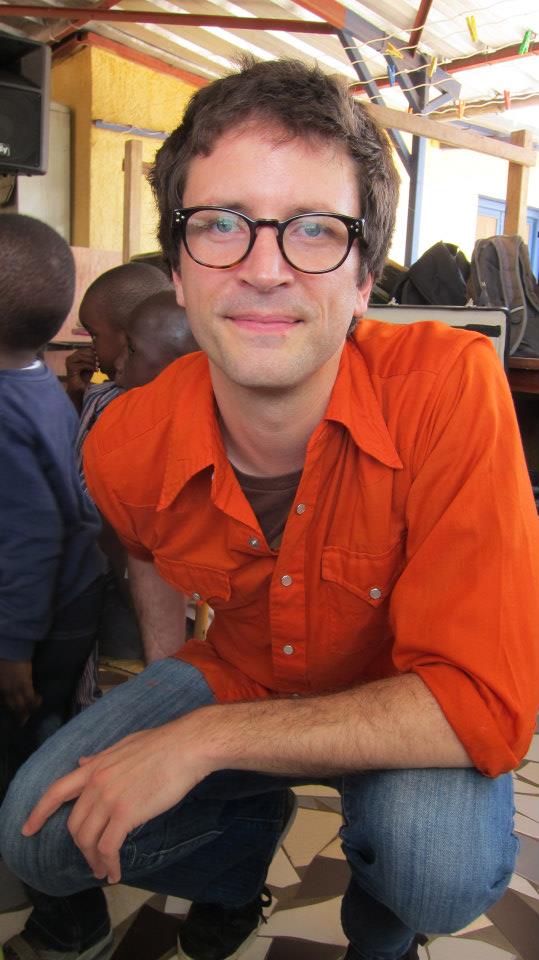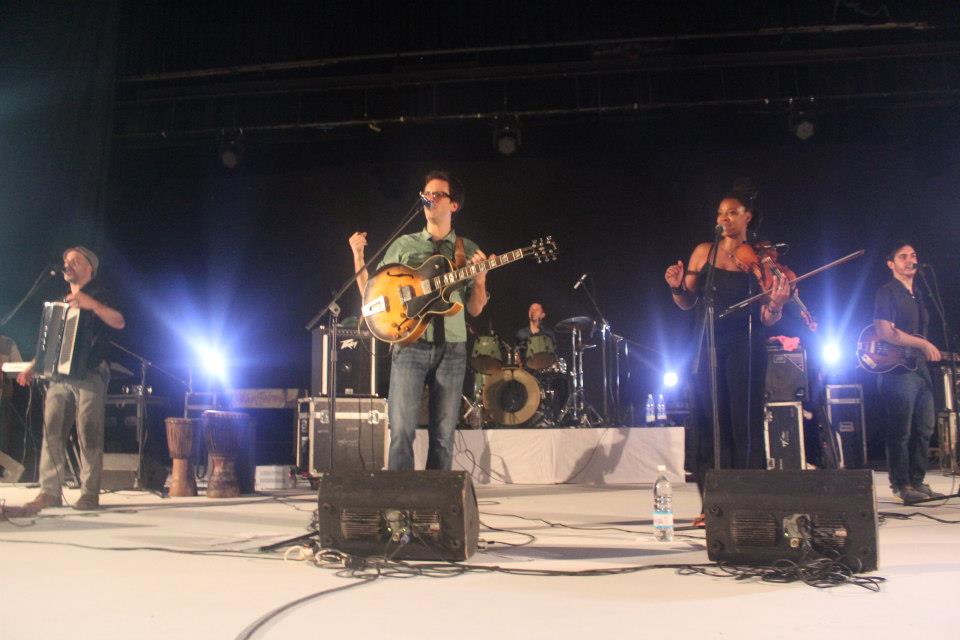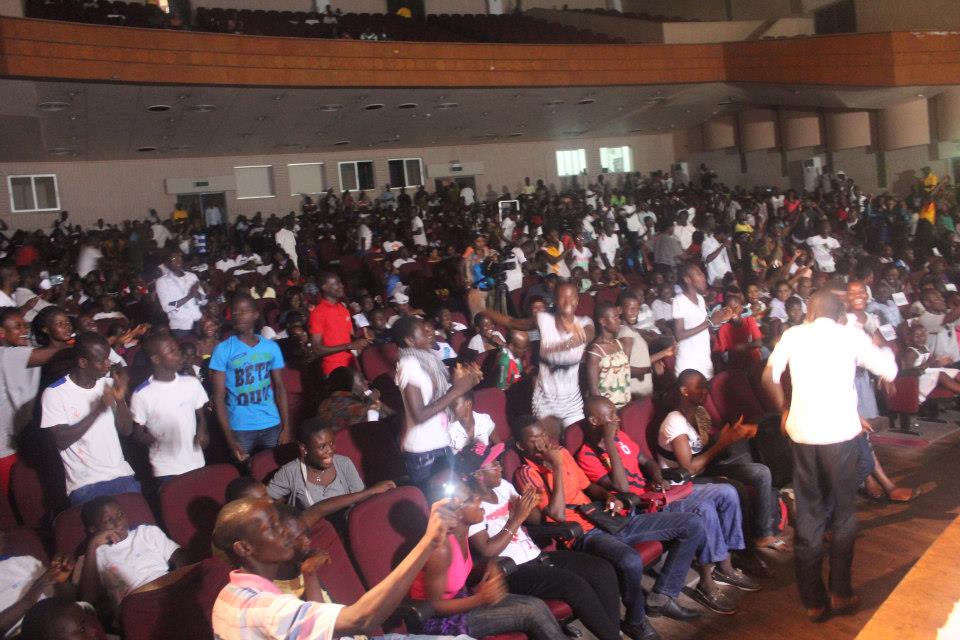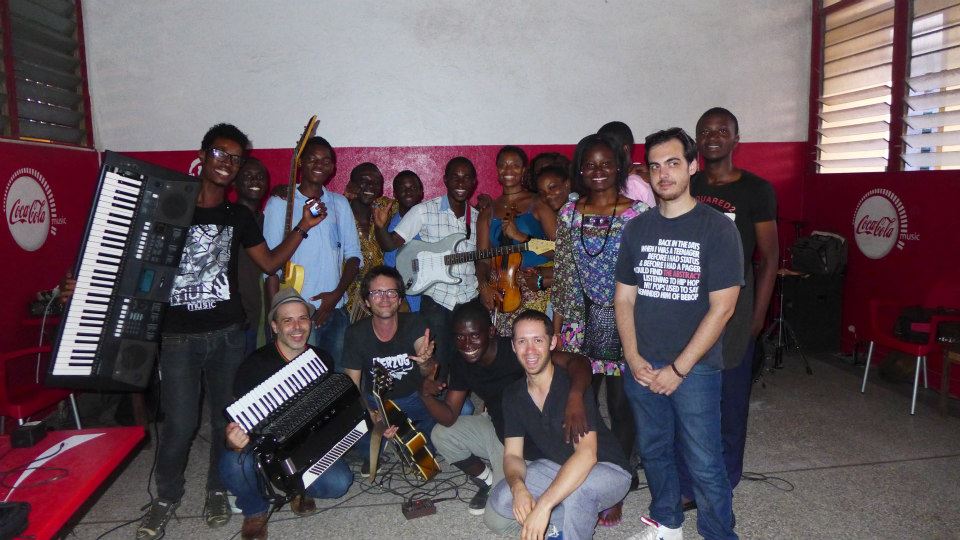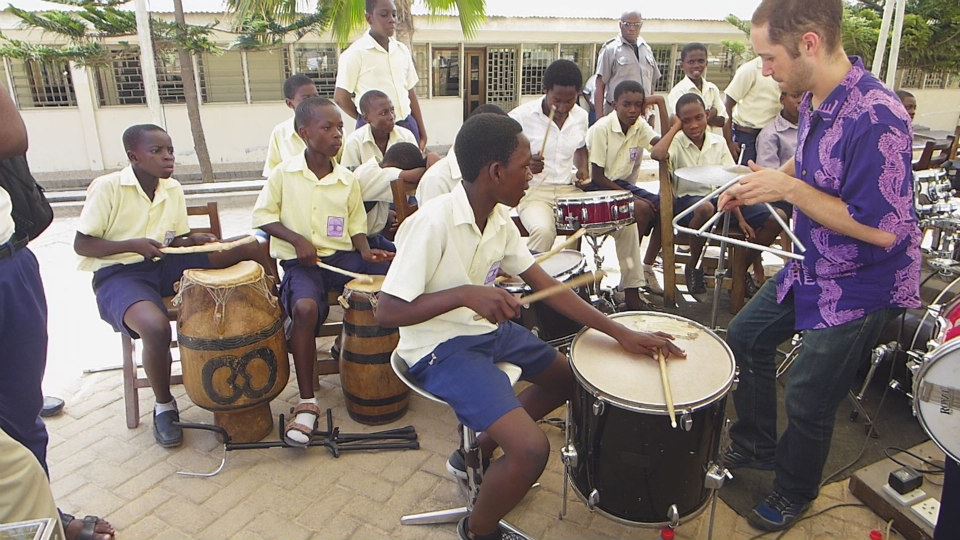Matuto is a New York-based band which creates their own original songs from a mixture of Northern Brazilian and Appalachian musical influences. Founded by South Carolina native Clay Ross, Matuto (which is Brazilian slang for 'country bumpkin') has been serious about Brazilian music for a while: besides individual study at home and abroad, the group traveled together to Brazil in 2009, when they received a Fullbright Grant for a six week residency in Recife. We recently caught up with Clay Ross here in New York, just after Matuto had returned from a five week, five country tour of West Africa, and just as their second full length album, The Devil and the Diamond, came out on Motéma Music (check out a few tracks here).
Morgan Greenstreet: Hello, Clay, how’s it going?
Clay Ross: Great, nice to meet you.
M.G.: Nice to meet you, too. If you can just start with a brief history of the band. What is the concept? How did you get into music from the north of Brazil?
C.R.: So, long story short, I’m from South Carolina. I moved to New York City to pursue a jazz career. I met Cyro Baptista, the Brazilian percussionist, started to work in his band and fell in love with the Brazilian rhythms that I was exposed to. I started to travel to Brazil and study the music more intensely. And then I came up with this concept and this idea to mix my own roots music from the Carolinas and the South with the Brazilian rhythms I had fallen in love with.
M.G.: Did you do that as a way of creating a better personal connection to Brazilian music?
C.R.: Yeah, exactly. I mean, just to be honest with the fact that I’m an American, and I’m not Brazilian, but I love that music, and I want to make it a part of what I do. It’s just an honest reflection of my inspiration in music.
M.G.: So is that part of the reason why you don’t often sing in Portuguese?
C.R.: Yeah, I don’t write songs in Portuguese, although we do sing in Portuguese and I do sing in Portuguese and speak Portuguese, but I don’t write songs in Portuguese, or at least I haven’t yet. You know, writing music, when you sing something, it’s very personal. Our words, our songs are about life and truth and peace, and things that we find important. At this point, I just feel more comfortable writing and singing in English.
M.G.: How did Matuto get the chance to tour in Africa? Was that through the State Department tours?
C.R.: Yeah, that’s right.
M.G.: How did that come about?
C.R.: It’s an audition process. They have a program called American Music Abroad, which I have participated in since 2005. I’ve won two auditions and been an alternate in four auditions. I always apply because it is an incredible program, but it is very competitive, and it’s become increasingly competitive. When I first did it, it was narrowed only to Latin jazz music, but now it’s really a broad selection of music. They only invite ten bands to tour, and over three-hundred bands apply from all over the country.
M.G.: Wow. Why was it only Latin jazz in the beginning?
C.R.: Well, they went through many changes in the program, and by the time I became aware of the program, they had settled on doing more theme-based programs, so maybe one year they would do the music of Louis Armstrong, and they would send bands to tour to play the music of Louis Armstrong, the next year they would do Latin jazz music and they would send bands to tour under the umbrella of Latin jazz. This is a program that Louis Armstrong participated in, Dizzy Gillespie participated in, Duke Ellington…So the State Department has been doing this since the days of the Cold War.
M.G.: Right. So, I clearly hear the American influences in your music, but it seems to me that the root is Brazilian music. So how did you pull that off, at the audition?
C.R.: That’s a good question. The reality is that American music and Brazilian music are the same, in that they’re both American music, they both share the same ingredients that created all the music of the Americas, whether it’s North America or South America. So when you look at it from that perspective, the influence of Africans through the Trans-Atlantic slave trade; and the European colonialists; and indigenous people, colliding in the New World, that’s a common thread that runs throughout the Americas. Whether its Brazil, whether it’s country music, or choriño, or bossa nova, or samba music, or the blues, or even hip-hop, it’s all the same in that way. That was sort of the perspective, and the frame that we use when we talk about Matuto in the context of American music abroad and working for the State Department. And that’s not to say that some people don’t see it differently. The more you know about any musical style, the more you can argue its uniqueness.
M.G.: Yeah.
C.R.: A funny side note about that. More than once on the tour, we would play for the highest officials in any country; we’d play for the US ambassadors, and then we’d play for high government officials and other visiting officials from other countries. And almost always, the Brazilian ambassador would be there at the consulate. And at least twice, I’m standing, talking to American ambassador, and he’s complimenting us on a great performance, and the Brazilian ambassador came up on the side and said, “Man, you’re doing my job for me! You’re promoting Brazilian culture!”
M.G.: Totally!
C.R.: When you look deeper into it, from the perspective of American music, the broad perspective of American music, there’s a shared story there. And more sort of superficially, Americans have been adopting Brazilian rhythms and Brazilian music for years, I mean, bossa nova was a huge craze! Charlie Byrd, who is a great musician, and Stan Getz, who made the quintessential American/Brazilian fusion record with Girl from Ipanema... That whole thing, all of that happened because of the US State Department. Charlie Byrd was on a State Department tour in Brazil, playing jazz music, when he heard the bossa nova rhythm, and then he brought it back to Stan Getz, and that led to this huge phenomenon in the US of bossa nova, the popularity of bossa nova in the US. Which even led Elvis Presley to record a song called, “Bossa Nova Baby,” like this fusion of rock and bossa nova. And that was in the ‘60s! So this conversation has been going on… And then you look at the tropicalia movement in Brazil, Caetano Veloso, Gilberto Gil, Tom Ze, all these incredible musicians who we really love and are inspired by, they were just trying to do what the Beatles do! They were trying to use Brazilian music and play rock and roll, and incorporate rock and roll into their Brazilian sound. And then furthermore, rock and roll, the British invasion, is a reflection of American roots music coming back from Britain, from the Old World. So it’s really interesting to me, at the end of the day, it really just comes down to, is it good or not? That's the only reason the State Department would even send musicians out! I’m thinking that’s why they liked our music, and why they might even overlook the fact that maybe it’s strongly Brazilian. From one perspective, yeah, it is strongly Brazilian, but it’s also really good! It’s smart, and it’s joyful, and that’s the type of thing that the US State Department wants to promote abroad, you know?
M.G.: Right. So how many countries and which countries did you visit in Africa? And how was the music received generally, and then specifically in different countries? And in different situations, playing for ambassadors, and playing for school children?
C.R.: We were on the road for five weeks, and we played in five countries: we played in Mozambique, Cote D’Ivoire, Ghana, Cameroon and Senegal.
M.G.: Nice!
C.R.: It was unbelievable, life-changing and life-affirming in every way. The music was, man, it was pretty incredible, because the first country was Mozambique, and the national language there is Portuguese, so we had the advantage that we could speak Portuguese. It made communicating, obviously, a lot easier, and they really responded to our Brazilian songs where we sing in Portuguese. (Matuto in Maputo!)
M.G.: So you speak Portuguese, and who else speaks Portuguese in the band?
C.R.: Myself, Rob Curto, much better than me, Mike Lavalle, our bass-player, speaks fluent Portuguese, Richie Barshay, our drummer, he speaks decent Portuguese, so everybody speaks a little bit at different levels, and there are a couple that speak perfect Portuguese, so that was a big help. And that was a great way to start. And then we went to the French speaking countries, like Cote D’Ivoire. Cote D’Ivoire was insane, the kids…That was one of our biggest shows. There’s some video that we’re going to be putting out soon. We were playing an auditorium for a thousand kids and they just loved it, they really reacted, I think they reacted most to the energy of it. We have this songs, this really overtly bluegrass, American-country song called “Chicken Teeth. ”And when we hit that people were freaking out, you know!
M.G.: Why do you think that was?
C.R.: Well, I think, at the end of the day, that’s really different for them! That’s really different. Their music....The whole thing that I fell in love with about Brazilian music was that it was, to me, a deeper level of the polyrhythmic conversation that happens in jazz music. I discovered jazz music, and what excites me so much about jazz was the rhythmic possibilities, the rhythmic overlap. You listen to most rock music and a lot of Western and European music, and it’s very square, very straight, on the beat—not so much syncopation or overlapping rhythms. I loved that rhythmic vocabulary in Brazilian music, and that’s the African influence. Then when you get into the history of it, you see there’s a really strong argument for why the rhythmic influence is so much more pervasive in Brazilian music than in American roots music. That’s because in Brazil, there was a bigger problem of transatlantic slavery than anywhere else in the Americas; it was the last country to abolish slavery, and it had the biggest influx of African slaves. Therefore, they couldn’t control the slaves as well.
M.G.: Well, it’s also the practices—the practices of the Portuguese slaveholders and likewise the Spanish slaveholders in Cuba versus the English and later American slaveholders in the United States. The way they ran discipline, etc., the way that they allowed people to live together or separated them, outlawed drums or didn’t outlaw drums, really affected those cultures. Did you feel that connection on this tour, especially in Mozambique, where it’s possible that some of that rhythmic influence came from? You seem to be saying that people in African connected most to the things in your music that seemed most different from their music, but was there also a connection to things that may be more similar to their music?
C.R.: Yeah, certainly. That was what was cool about it; that part of it made it just so easy to collaborate. We collaborated with a lot of local musicians. In fact, every concert we gave had some element of collaboration with a local group, and that was incredible.
M.G.: How would that work out? Would you find them, or would the State Department hook you up with musicians, or what?
C.R.: In some cases, the State Department found them, and in other cases I worked through my network of social media or whatever to find people, but we worked together to find people. And we found great groups! We would usually teach them one of our songs and they would teach us one of their songs. And then we would do that at the end of the concert. I mean, it was just so easy to do that since all those ingredients were in our music somehow, however they may have been subtly different or nuanced. It was like looking into a time machine or something. So yeah, the collaborative aspect of it was the best part. And also, for me and for everyone in the band I think, it framed the African diaspora and African music in general, but certainly the African diaspora in the Americas. It gave us so much of a context to understand it on a completely different level.
M.G.: How so?
C.R.: Because you can talk about something until you’re blue in the face, but nothing is as powerful as going to a place, meeting the people, drinking the water, eating the food, feeling what it’s like. At least in a very superficial way or a small way, having a day in their shoes, you know?
M.G.: So did any of those jam sessions or collaborations with local musicians—will any of those inspire your music in the future, in terms of future hybridizations?
C.R.: Well yeah, it definitely will. We created a project—we have a concert at Lincoln Center on June 20—where we’ll be doing a suite called African Suite. Each musician in our band contributed one movement to a five-movement suite inspired by each of the five countries that we visited on our tour.
M.G.: Oh, awesome! Excellent.
C.R.: Yeah, it’s going to be incredible. So we’re really excited about that. We’re doing that in conjunction with our studio release party for the Devil and the Diamond records and then we’re doing two shows and our studio release concert, and at the same time we’re going to do the Africa Suite premiere.
M.G.: That sounds really exciting.
C.R.: Yeah, we're super excited about that. We’ve already started rehearsing the music and it’s cool to see how the things we heard came into the new writing, and what the different band members came up with. It’s really neat!
M.G.: One other small thing: while you were in Ghana, did you happen to hear the country radio station?
C.R.: Yeah, so that was another thing that was kind of a trip. Ghana is such a conservative country—there’s a lot of Christianity (it’s the main religion there), a lot of Orthodox Christians. And country music is really popular! That was kind of a culture shock for us. We didn’t really expect that.
M.G.: Nor did I. I was there a few years back and it blew my mind! Mainly, I found cab drivers listened to the country station a lot. I’d be in a cab and I’d be like, “Why are you listening to this?” I’d actually ask guys, “What do you like in this music?” And they’d usually just say, “I like it—it’s nice music.” But to me, it was definitely a culture shock. You know, I was there to drum and go to the village and experience traditional African music, and these guys were listening to country! Anything else you want to say about how the music was received in different places?
C.R.: Well, I could just share another cool story that was kind of memorable. Hip-hop is huge—that’s the music that’s taking over the world. It's reflected in the youth culture everywhere you go in the world. When we were in Senegal, we went to a hip-hop academy there, and we went there and collaborated with a lot of emcees and an incredible DJ, and that stood out for me as one of the most memorable moments of the tour, because it worked, man! They were cool and respectful of what we were doing, and we set up the band, set up the turntables, had the mics up, and we were playing our grooves and they were spinning and scratching on top, rhyming on top, and rapping in wolof, and it was awesome. That was really a memory, you know?
M.G.: Yeah, and you wouldn’t have necessarily thought of doing that here or expected to do that there, maybe?
C.R.: Yeah, I definitely wouldn’t have thought to do that here, and I never would have thought to do that there, but it was really special and it made me feel like we were communicating. I love hip hop, man, when I was a kid, I grew up on A Tribe Called Quest and the Beastie Boys and all those bands...That’s old school stuff now, but it’s cool to see that thread, because it’s all just a continuation fo the same thing in a different way.
M.G.: Totally! Well Clay, thanks so much!
C.R.: See ya man! Nice talking to you Morgan.
M.G.: I’ll seek you out on June 20th at Lincoln Center Out of Doors Festival.
C.R.: All right brother.








